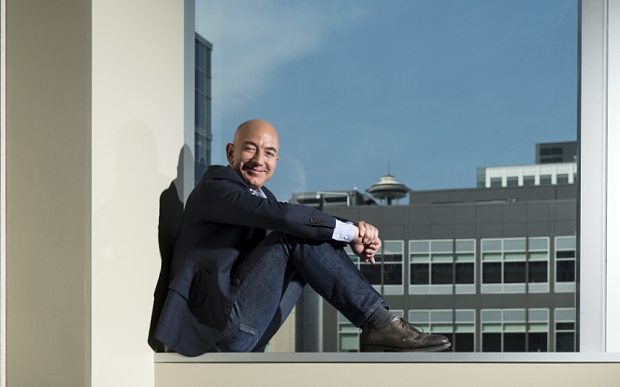Startups
5 Lessons Millennial Startups Can Learn from Jeff Bezos

Of all the entrepreneurs dominating tech today, Jeff Bezos has emerged as one of the few that are still breathing after the .com bubble burst in 2000.
Bezos joined the world of the internet in 1995 and despite the huge crash, Amazon continued to breathe because of his resilience, vision and refusal to give up despite facing humongous odds. Many call him America’s foremost CEO, after Steve Jobs.
Here are 5 takeaways from Bezos’ philosophy:
1. The empty chair philosophy
During Amazon’s early days, Bezos insisted on placing an empty chair in each executive meeting. To all attendees, this was Amazon’s customer and the empty chair was to act as a reminder that no decision they made should displease the most important attendee of their meeting.
From the get-go, Bezos has been pretty clear about his desire to make Amazon a customer-obsessed firm. This customer-centric philosophy is what has made Amazon the world’s foremost e-commerce firm. Millennials will do well to remember that no matter how old, the “customer is king” belief still holds true.
“The best customer service is if the customer doesn’t need to call you, doesn’t need to talk to you. It just works.” – Jeff Bezos
2. Apologizing shouldn’t hurt your ego
Back in 2009, Amazon angered users by deleting legally bought copies of George Orwell’s “Animal Farm” and “1984”, because they were being sold illegally by an unnamed seller. For any firm, this would probably be deemed as a mid-level crisis.
For Bezos, however, anything that hurt his customers, hurt him. Therefore, he personally penned an informal apology letter to all users. He said, “Our ‘solution’ to the problem was stupid, thoughtless, and painfully out of line with our principles…we will make better decisions going forward[.]”
As a startup, you may feel that admitting a mistake may lose customers but refusing to do so will push them further away. In the example stated above, most firms would have simply released a press statement to apologize for the error. The worst ones would adamantly deny they were at fault. When the mistake first occurred, customers were furious. Bezos’ heartfelt plea for forgiveness won them over.
3. The two-pizza philosophy
Jeff Bezos is a firm believer in small, sovereign units. In his own words, if a team cannot be fed by two pizzas, it’s too large. In statistical terms, a team must comprise of 5 – 7 people. The Amazon Gold Box, for example, was an idea that originated during one of these two-pizza team discussions.
This attitude correlates with Bezos’ other active belief – the constant removal of waste. According to him, large teams become inefficient and usually find it hard to come to a decisive result, wasting resources along the way.
Unsurprisingly, this idea has been catching on as small businesses continue to sprout online. Firms, like AMZInsight, prefer assigning tasks to a small group of people. It gets the job done quickly and allows ideas to flow freely.
4. It’s the long-term that matters
When Amazon makes a gigantic investment, they’re almost always criticized. Ten years down the line, when the investment pays off, the same critics sing Bezos’ praises.
If a strategy or plan seems revolutionary to him, Bezos shrugs off the disapproval. He can wait half a decade to get a return on his investment but if something feels right to him, he’s got to do it now. For example, when eBooks were first introduced, Amazon was the only store to offer them at prices lower than their print editions, generating short-term losses.
Today, all eBook editions are cheaper but because of an early start, Amazon has already captured most of the market. Therefore, if you believe something will work, go for it and don’t worry about short-term returns.
“A brand for a company is like a reputation for a person. You earn reputation by trying to do hard things well.” – Jeff Bezos
5. Failure is a prerequisite to innovation
As mentioned above, Amazon began when the internet was still a baby and online commerce was growing on uncertain soil. Bezos went in fully aware of the failures waiting for him. He told his first investors that: “…there’s a 70 percent chance you’re going to lose all your money, so don’t invest unless you can afford to lose it.”
However, instead of feeling limited by imminent failure, Bezos felt powerful. He knew he was going to fail but he also knew that nothing would stop him from pushing Amazon off the ground. He felt liberated since he knew what the future held for him. Ironically, it was this mentality that set shop for his success. Expect failure but don’t let it hinder your plans. Instead, prepare to face it head on.
What have you personally learned from Jeff Bezos? Please share your thoughts in the comment section below!
Startups
The Secret to Using Video for Maximum Impact and Brand Growth
Master video storytelling to captivate, engage, and grow your brand

The Power of Video in Engagement and Personal Branding
How does one master the ability to captivate an audience? This capability can mean the difference between success and obscurity, but knowing how to achieve it is the biggest challenge. (more…)
Startups
6 Misconceptions About Digital Products That Are Costing You Time and Money
Avoid these 6 digital product myths and build a real business

You’ve probably seen or heard someone talking about how selling online products and digital courses is as easy as 1, 2, 3 and you’re making $10,000 in your sleep overnight. (more…)
Startups
5 Digital Solutions Every Business Needs to Stay Competitive in 2025
Boost efficiency & stay competitive with smart digital solutions

Businesses must adapt to rising customer expectations to stay competitive. Success in 2025 depends on digital solutions that improve growth, customer experience, and efficiency.
Market competitiveness, sluggish manual procedures, and growing maintenance expenses can all be addressed via custom digital transformation. Let’s examine how these customized solutions might transform your company for sustained success. (more…)
Startups
7 Strategic Shifts to Help You Scale Your Business Smarter, Not Harder
Boost your business with clear goals, automation, and strategy

Do you believe your business is capable of doing better but aren’t sure where to start? Every entrepreneur wants to scale up, but without a well-crafted methodology, scaling can feel like running in circles. (more…)
-

 Life3 weeks ago
Life3 weeks agoHarness the ‘Battery Effect’ to Transform Life’s Tensions into Your Greatest Strength
-

 Life4 weeks ago
Life4 weeks agoDoing This for 30 Minutes a Day Can Unlock Your Full Potential
-

 Startups4 weeks ago
Startups4 weeks ago7 Strategic Shifts to Help You Scale Your Business Smarter, Not Harder
-

 Entrepreneurs2 weeks ago
Entrepreneurs2 weeks ago10 Powerful Steps to Define and Solve Any Hard Problem Effectively
-

 Entrepreneurs2 weeks ago
Entrepreneurs2 weeks agoHow Smart Entrepreneurs Leverage User Feedback for Market Success
-

 Entrepreneurs4 weeks ago
Entrepreneurs4 weeks agoHolistic Entrepreneurship: The Overlooked Formula for Long-Term Growth
-

 Startups3 weeks ago
Startups3 weeks ago6 Misconceptions About Digital Products That Are Costing You Time and Money
-

 Entrepreneurs3 weeks ago
Entrepreneurs3 weeks agoThe Secret to Resolving Employee Disputes Without Losing Productivity






























2 Comments